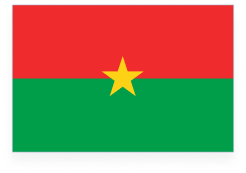Burkina Faso translates to “Land of the Honorable People.” These honorable people are called Burkinabés and are located between the Sahara Desert and the Gulf of Guinea.
While it may not be a common travel destination, visiting Burkina Faso offers the chance to learn about local traditions, music, and community life through direct experience. Whether walking through a market, listening to live drumming, or speaking with locals, time spent here can give insight into daily life and values that shape the country today.
| Key Facts About Burkina Faso | Details |
| Population(2025) | 24,074,580 |
| Official Language | Moré, Bissa, Dyula, and Fulao |
| Capital |
Ouagadougou
|
| Currency |
West African CFA franc
|
| Area | 105,796sq mi(274,000 km²) |
| Main Religion | Islam |
Let’s learn more Burkina Faso facts and how it maintains its legacy of honor.
8 Fun Facts About Burkina Faso

- Burkina Faso is a landlocked country in West Africa that shares borders with six countries
- Burkina Faso was formerly known as Upper Volta
- The most spoken language in Burkina Faso is Mooré
- Thomas Sankara introduced progressive reforms and earned the nickname “African Che Guevara”
- Burkina Faso’s economy is agrarian
- The Mossi are Burkina Faso’s largest ethnic group
- Burkina Faso uses the West African CFA franc (XOF) as its official currency alongside other nations in the Franco-African community
- Islam is the dominant faith in Burkina Faso
1. Burkina Faso is a landlocked country in West Africa that shares borders with six countries
Burkina Faso is a landlocked country in West Africa bordered by Côte d’Ivoire (Ivory Coast), Mali, Niger, Benin, Togo and Ghana. Burkina Faso’s neighboring countries are its largest trade partners.
>>Check out all our Student Travel Programs in Africa
Those in northern Burkina Faso face dry weather conditions.
2. Burkina Faso was formerly known as Upper Volta
Burkina Faso was known as the French Upper Volta during its time as a French colony. The colony lasted from the 19th century until its independence in 1960.
As a French protectorate, it became part of French West Africa where colonial government influenced economic and political ties.
>>Learn more about French history, check out our Programs in France
The country is no longer under French control, but the country’s influence can still be noticed in Burkina Faso’s language, legal framework and currency.
| Year | Name | Description |
|---|---|---|
| Pre-1960 | Upper Volta (Haute-Volta) | Upper Volta is the name given to the area during French colonial rule. It comes from the Volta River system. |
| 1960 | Republic of Upper Volta | After independence from France, the country was known as the Republic of Upper Volta. |
| 1984 | Burkina Faso | President Thomas Sankara renamed the country Burkina Faso, meaning “Land of the Honorable People” in Mòoré and Dioula languages. |



